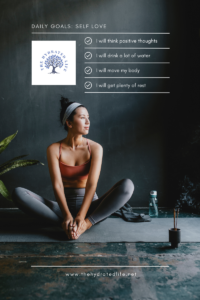
The Triad of Love: Loving yourself and others
Love is a powerful emotion that can transform our lives and make us feel whole. It is often said that love comes in three forms: the love we have for others, the love others have for us, and the love we have for ourselves. The triad of love is a delicate balance, and it is important to understand the role that each form of love plays in our lives. In this blog, we will explore the importance of self-love in the triad of love for our well-being.
The love we have for others.
We can express this love in many ways, from feeling affection for our friends and family to experiencing romantic love for our partners. Loving and being loved by others is an essential part of our human experience, bringing us a sense of happiness and fulfillment.
The love others have for us.
This love can also come in many forms, such as the love our parents have for us, the love our friends have for us, and the love our partners have for us. When others love us, we feel valued, appreciated, and supported. It is an important part of our emotional wellbeing to be loved and cared for by others.
Self Love is the third form of love in the triad
However, the third form of love in the triad is often overlooked, and that is the love we have for ourselves. Self-love is the foundation of our emotional wellbeing and is essential for our overall happiness and fulfillment in life. When we love ourselves, we have a strong sense of self-worth, and we value ourselves as individuals. We treat ourselves with respect and kindness, and we are better equipped to handle life’s challenges.
The triad of love is a delicate balance, and it is important to understand the role that each form of love plays in our lives. If we focus too much on loving others and being loved by them, we can neglect our own needs and lose sight of our own worth. On the other hand, if we focus too much on self-love and neglect the love we have for others and the love they have for us, we can become isolated and disconnected from the people around us. Check out this article Forbes posted on practicing self love.https://www.forbes.com/health/mind/how-to-practice-self-love/.
So, why is self-love so important in the triad of love? Here are a few reasons:
Self-love improves our relationships
When we love ourselves, we are better able to love others. We are more patient, compassionate, and understanding, and we are less likely to judge or criticize others. We are also more confident and secure in ourselves, which can help us form stronger, more meaningful connections with others.
Self-love reduces stress and anxiety
When we love ourselves, we are less likely to experience stress and anxiety. We are more resilient and better able to cope with life’s challenges. We are also more likely to practice self-care, which can help us manage stress and anxiety more effectively.
Self-love boosts our self-esteem
When we love ourselves, we have a strong sense of self-worth and value. We are less likely to compare ourselves to others or seek validation from external sources. We are also more likely to pursue our passions and goals, which can help us feel fulfilled and happy in life.
Self-love helps us set healthy boundaries
When we love ourselves, we are better able to set healthy boundaries in our relationships. We are more likely to say no to things that don’t serve us or make us happy, and we are more likely to prioritize our own needs and desires. This can help us maintain healthy, fulfilling relationships with others.
So, how can we cultivate self-love in our lives? Here are a few tips:
Practice self-care
Self-care is an essential part of self-love. Self-care involves taking care of our physical, emotional, and mental health. It can be something as simple as taking a bubble bath or going for a walk, or it can be more involved, such as hiring a life coach or starting a meditation practice.
Some other ways to practice self-care include:
Getting enough sleep: Sleep is essential for our physical and mental health. Aim for 7-9 hours of sleep each night.
Eating a healthy diet: Eating a balanced diet can help improve our mood, increase our energy levels, and reduce our risk of chronic diseases.
Engaging in physical activity: Exercise is a great way to boost our mood, reduce stress, and improve our overall health.
Practicing mindfulness: Mindfulness involves paying attention to the present moment without judgment. It can help reduce stress and improve our overall wellbeing.
Pursuing hobbies and interests: Doing things we enjoy can help us feel fulfilled and happy in life.
Practice self-compassion
Self-compassion involves treating ourselves with kindness, understanding, and compassion. It involves being gentle with ourselves when we make mistakes, rather than beating ourselves up or being self-critical. Some ways to practice self-compassion include:
Speaking kindly to ourselves: Use positive self-talk and avoid negative self-talk.
Practicing forgiveness: Forgive yourself for past mistakes and learn from them.
Practicing self-acceptance: Accept yourself as you are, flaws and all.
Set healthy boundaries
Setting healthy boundaries involves knowing our limits and communicating them to others. It involves saying no to things that don’t serve us or make us happy, and prioritizing our own needs and desires. Some ways to set healthy boundaries include:
Saying no when we need to: Don’t feel guilty about saying no to things that don’t align with your values or priorities.
Communicating our needs: Let others know what you need from them in your relationships.
Prioritizing self-care: Make time for self-care activities and prioritize your own wellbeing.
Practice gratitude
Practicing gratitude involves focusing on the positive things in our lives and being grateful for them. It can help shift our perspective from one of lack to one of abundance. Some ways to practice gratitude include:
Keeping a gratitude journal: Write down things you are grateful for each day.
Saying thank you: Express gratitude to others when they do something kind or helpful.
Focusing on the present moment: Pay attention to the good things happening in the present moment, rather than worrying about the past or future.
Practice self-reflection
Self-reflection involves taking time to think about our thoughts, feelings, and behaviors. It can help us better understand ourselves and make positive changes in our lives. Some ways to practice self-reflection include:
Journaling: Write down your thoughts and feelings to gain insight into them.
Meditating: Spend time in quiet contemplation to reflect on your thoughts and feelings.
Seeking feedback: Ask trusted friends or family members for feedback on your behavior and how it affects others. If you would like to work on your self love, The Hydrated Life coaching program is available for you here. https://thehydratedlife.net/
In conclusion, the triad of love involves loving others, being loved by others, and loving ourselves. While all three forms of love are important, self-love is often overlooked but essential for our emotional wellbeing and overall happiness in life. By practicing self-care, self-compassion, setting healthy boundaries, practicing gratitude, and self-reflection, we can cultivate self-love in our lives and create a more fulfilling and meaningful life.
